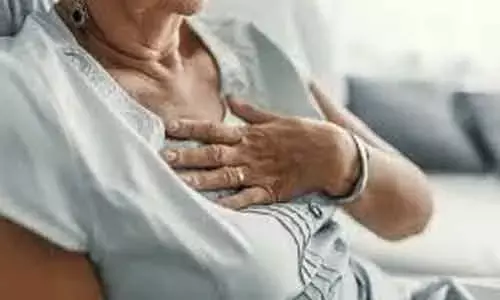- Home
- Medical news & Guidelines
- Anesthesiology
- Cardiology and CTVS
- Critical Care
- Dentistry
- Dermatology
- Diabetes and Endocrinology
- ENT
- Gastroenterology
- Medicine
- Nephrology
- Neurology
- Obstretics-Gynaecology
- Oncology
- Ophthalmology
- Orthopaedics
- Pediatrics-Neonatology
- Psychiatry
- Pulmonology
- Radiology
- Surgery
- Urology
- Laboratory Medicine
- Diet
- Nursing
- Paramedical
- Physiotherapy
- Health news
- Fact Check
- Bone Health Fact Check
- Brain Health Fact Check
- Cancer Related Fact Check
- Child Care Fact Check
- Dental and oral health fact check
- Diabetes and metabolic health fact check
- Diet and Nutrition Fact Check
- Eye and ENT Care Fact Check
- Fitness fact check
- Gut health fact check
- Heart health fact check
- Kidney health fact check
- Medical education fact check
- Men's health fact check
- Respiratory fact check
- Skin and hair care fact check
- Vaccine and Immunization fact check
- Women's health fact check
- AYUSH
- State News
- Andaman and Nicobar Islands
- Andhra Pradesh
- Arunachal Pradesh
- Assam
- Bihar
- Chandigarh
- Chattisgarh
- Dadra and Nagar Haveli
- Daman and Diu
- Delhi
- Goa
- Gujarat
- Haryana
- Himachal Pradesh
- Jammu & Kashmir
- Jharkhand
- Karnataka
- Kerala
- Ladakh
- Lakshadweep
- Madhya Pradesh
- Maharashtra
- Manipur
- Meghalaya
- Mizoram
- Nagaland
- Odisha
- Puducherry
- Punjab
- Rajasthan
- Sikkim
- Tamil Nadu
- Telangana
- Tripura
- Uttar Pradesh
- Uttrakhand
- West Bengal
- Medical Education
- Industry
Vitamin D deficiency linked to backache in postmenopausal women

CLEVELAND, Ohio (February 12, 2020)--Lumbar disc degeneration is a common musculoskeletal disease that often causes lower back pain. A new study has tried to evaluate the relationship of vitamin D deficiency with a backache.
Researchers have found that vitamin D deficiency, smoking, high body mass index (BMI), and osteoporosis are risk factors for greater back pain. Study results are published online today in Menopause, the journal of The North American Menopause Society (NAMS).
Lumbar disc degeneration and resulting lower back pain become greater concerns with age and disproportionately affect women more than men, likely as a result of decreasing estrogen levels during menopause. Previous studies have shown the effect of estrogen on disc degeneration, which partially explains why degeneration is more severe in postmenopausal women than in men of the same age. In addition to lower estrogen concentrations, vitamin D deficiency is common during the postmenopause period.
Vitamin D is critical in maintaining levels of calcium and phosphorus, helping to prevent bone diseases such as rickets and osteoporosis. Recent studies have shown that vitamin D deficiency is associated with lower back pain and that supplementation can relieve this pain and improve musculoskeletal strength. But few studies have been conducted regarding the role of vitamin D in spinal degeneration, especially in postmenopausal women.
This new study evaluated vitamin D status in postmenopausal women and its relationship with disc degeneration and lower back pain. It concluded that vitamin D deficiency is highly prevalent in postmenopausal women and that a serum concentration of vitamin D less than 10 ng/mL, indicating severe deficiency, should be considered an indicator of severe disc degeneration and lower back pain. It further identified additional risk factors such as smoking, high BMI, and osteoporosis for lower back pain beyond vitamin D deficiency.
Study results appear in the article "Does vitamin D status influence lumbar disc degeneration and low back pain in postmenopausal women? A retrospective, single-centre study."
"This study shows that very low vitamin D levels were linked to a greater likelihood of moderate to severe lower back pain and more severe lumbar disc degeneration, possibly because of the beneficial effects vitamin D has on nerve and muscle pain sensitivity, muscle strength and mass, and inflammation. Although not all women need vitamin D supplementation, this speaks to the importance of avoiding severe vitamin D deficiency states," says Dr. Stephanie Faubion, NAMS medical director.
For further reference log on to :
Dr Kamal Kant Kohli-MBBS, DTCD- a chest specialist with more than 30 years of practice and a flair for writing clinical articles, Dr Kamal Kant Kohli joined Medical Dialogues as a Chief Editor of Medical News. Besides writing articles, as an editor, he proofreads and verifies all the medical content published on Medical Dialogues including those coming from journals, studies,medical conferences,guidelines etc. Email: drkohli@medicaldialogues.in. Contact no. 011-43720751


